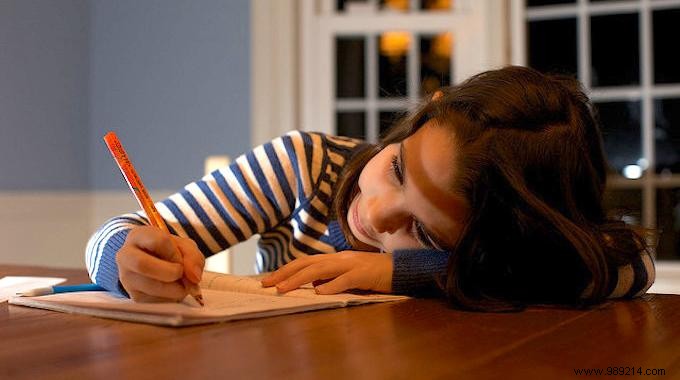
After 25 years of studying and analyzing the consequences of homework , the study conducted by Harris Cooper comes to an unequivocal conclusion:
- homework is detrimental to students.
In his book, The Battle over Homework , this homework specialist breaks down the causal relationship between homework and student success.
While homework has a positive impact in high school , their benefits drop in college.
And "in elementary school, the benefits of homework are non-existent," says Etta Kravolec, a professor at the University of Arizona in the United States.

According to this research, there are a number of reasons why teachers should not give primary school students homework :
Children starting school have so many years of education ahead of them that the last thing they need is to feel sick of school. On the contrary, children should rather have fun while learning.
The purpose of homework is to strengthen the relationship between parents and children and to encourage parental involvement in the education of children.
But primary school homework can have the opposite effect . Because at this age, children need to be reminded by their parents to do their homework.
After a long day spent studying at school, any activity involving the word “work” isn’t exactly what kids want before bedtime.
Unfortunately, it all too often ends in a painful battle. And the effects of this struggle will be felt years later, even as homework begins to show benefits...
Proponents of homework will argue that daily homework help children become more responsible .
But that's only true when they're older. When every night, parents must remind children to do their homework , this effect disappears completely.
According to studies conducted by Open Colleges featured in the article "The Tyranny of Homework:20 Reasons Why You Shouldn't Give Homework Over the Holidays" , many children do not get enough physical activity .
All students, especially younger ones, should spend their evenings and vacations doing physical activity, playing outside, and playing sports with their friends.
Teachers and parents should encourage children to do these activities more often.
Another problem with homework is that it often reduces children's sleep time . Children need an average of 10 hours of sleep per day. To be at 100% capacity the next day, they need a good rest.

Fortunately, there are many alternatives to avoid homework overload suffered by young students.
Here are concrete examples. They show what teachers and parents can do to make sure students stay motivated and open to learning new things:
According to research, what works much better than homework in primary school is reading .
Parents and teachers can therefore try to find topics that interest children. Then they can try to encourage them to read books on the subject on their own or read these books aloud while they are listening.
Customizing this activity for each student takes more effort than assigning common assignments to all students. But the benefits of “pleasure” reading are significant.
Instead of relying on homework to give children a sense of responsibility, it is better to rely on other daily activities to teach them to be responsible.
For example, getting up at a certain time and being ready in the morning, making your bed, helping with household chores, or even taking care of a pet.
Primary school students learn new things all the time. So parents and teachers should ensure that children understand this concept. Then doing homework to learn something new becomes second nature .
So much can be learned in a science or art exhibit!
But more importantly. The knowledge and experience acquired by going to the museum cannot be acquired any other way. Parents can therefore look for exhibits or activities that will arouse the interest of their children.
In conclusion, teachers and parents can take advantage of the time available after school so that creativity, sociability and learning converge in order to reinforce the training received by students at school.